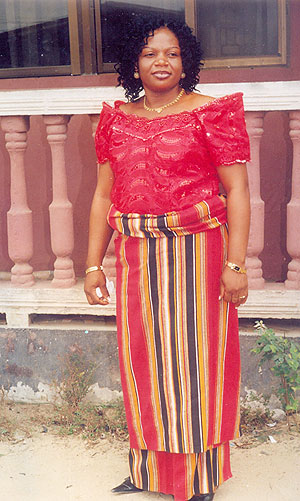Mercy Ibraye-George was my elder sister. People often said we looked alike because we both took after our late father, who was fair in complexion. After her secondary education, Mercy did not go to university.


Mercy Ibraye-George was my elder sister. People often said we looked alike because we both took after our late father, who was fair in complexion.
After her secondary education, Mercy did not go to university. Instead, she got a job with a restaurant in Port Harcourt. Her plan was to make some money to help support our education. My mother had been the only breadwinner of the family. "She can’t do it alone,” my sister always said. That was how we all went to school. Many years later, she got married and lived happily with her husband.
Mercy’s first pregnancy in November 2008 came with some complications, but she was able to deliver her baby boy safely through a Caesarean section. We all celebrated. She and her husband spent over US $1,000 for the operation. They borrowed some money from people to clear the mammoth hospital bills, and it took over six months to pay back.
I was shocked when my mother called me a few months ago and told me my "Big Sister” (as I always called her) was heavily pregnant again.
"I don’t think this is a good idea considering what she went through the last time,” I replied. "She should have waited until her son’s second birthday before getting pregnant again.”
"We know, but she’s concerned that she’s not getting any younger,” my mother responded in her defense.
"Please tell her to always go for her antenatal care visits,” I said.
”Okay, I will,” my mother said.
The problems started after her expected delivery date passed and there was no sign of delivery. It was the week of August 16, 2010. When I visited her one evening, I discovered that she had not gone for antenatal care because of the high cost of transportation in Port Harcourt; I gave her money to go to the clinic the following day. I visited her the next day, and she said the doctor had given her two weeks to deliver before he would have to operate.
"This should be her last pregnancy. If her husband insists on having another baby, I suggest she allow him to take a second wife,” I playfully told my younger sister in confidence that day.
"How could you say a thing like that?” she replied.
On Saturday, August 21, I visited Mercy before returning to Abuja. I advised her to take the doctor’s instructions very seriously. By then, my mum had moved in to live with her.
"Tonte, there is a traditional birth attendant who lives around here,” Mercy told me. "I think I’ll visit her for a check-up if I can’t afford to go to the hospital.”
”I don’t think she has the skills to handle an emergency when it arises,” I responded. "Please always stay close to the hospital.” I gave her some money and left for Abuja that afternoon, although I called frequently to check on her.
On August 31, I got so worried that I called Professor CT John of the University of Port Harcourt Teaching Hospital. I expressed concern that my sister’s doctor had not carried out the operation yet. He asked me to have her referred to the Teaching Hospital. I called Mercy to inform her and also asked my mum to discuss it with her husband when he returned from work.
But on the morning of September 1, I received a call and learned that that my Big Sister was dead. She did not want to have the Caesarean section. She had told my mum she could not afford to pay the high cost of hospital bills again, and she had secretly visited the traditional birth attendant who lives near her home without my knowledge. I was told that the traditional birth attendant inserted something into her, and she died after a few minutes.
The author is the National Coordinator, White Ribbon Alliance for Safe Motherhood, Nigeria.
Ends


